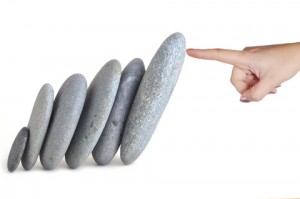As you study and learn music there comes a time that you cross the tipping point. That is, all of a sudden you find yourself playing or grasping a concept with ease.
I have recently observed this happening with my daughter's playing of the piano. Over the last several months I would be in my home office working on various things and I'd hear her practicing and realize that there was a definite change in the songs that she is playing.
A change which is starting to make me jealous of her abilities.
Efforts That Get You to a Tipping Point in Learning and Playing Music
I can attribute that directly to two things.
The first, she is putting in the time to learn and polish the songs she is learning. I'm lucky with my schedule to be able to get an hour in on the weekends.
The second, is she is learning and focused on the techniques. Me? Just trying to keep from atrophying with the lack of exercises to keep the fingers flexible. I witnessed that in just a two week period of time she was able to increase the speed of play on a specific song she was learning for her studio concert because of this effort.
The point being here is that you can achieve this tipping point with continued effort and practice. There is, however, another point to add to the observations and that is drive.
Driving to a Music Ability Tipping Point
The effort that she was putting in was driven by the desire to perform well at this mini concert. That drive can get you to the tipping point where things get better and easier.
I see this as having a very specific goal to perform. I experienced this in the time I had originally started in my lessons. As you learn music and the theory of music you apply that through the application of songs. This combined study is a process that allows you to progress forward. The focus of having to perform provides you another way to reach a tipping point in your music journey.
Working toward performance forces you to refocus your efforts and apply the knowledge and techniques to playing. It's a two fold effort of analysis and expression.
A Practical Trial You Can Try to Music Learning
Having said all these things is great, but how might you personally apply this to where you are at right now?
Well there is no way to answer that for everyone, but we can take an example of one thing and explore how you might use it today. Let's say you're working on a new scale.
First you're going to slowly work out the fingering of the notes. Then your going to work out the some timing as you play it. Next you may work on grouping the scale in phrase of four notes and accenting the first note of each group of four. Then you'll slowly increase the speed at which you play it pushing it forward.
Now that you are comfortable with that scale you'll look to a song or piece of music and find that the melody uses this scale in either a full form or a partial form. You'll begin learning this song and at the scale pattern you'll start thinking of playing that part as a scale.
You'll suddenly realize that it's something you already know and can implement it quickly.
Next you'll begin playing with this scale fragment and emphasizing specific notes and playing with the speed at which you attack the phrase. You'll start to see how it fits with the surrounding notes and phrases. You'll begin hearing how it fits in the flow of the melody.
Now take that passage or song and start focusing on performing it for an audience. Next thing you know you're beyond thinking of this scale but on performing this section and polishing up within the context of your song.
You'll reach a tipping point where you've moved from learning to performing.
You end up doing this type of a process for block chord changes, and broken chords, and melody notes within the chord.
A Plug of learning the Theory
This process becomes much faster when you understand the structure of music. The understanding of chords and scales and harmonic systems can get you to this tipping point much quicker than learning a song by trying to read notes.
I've experienced this myself and now I'm seeing it in other students. Make an effort to learn as much music theory as you can and apply that in a way that gets you to through the tipping point of learning music.

